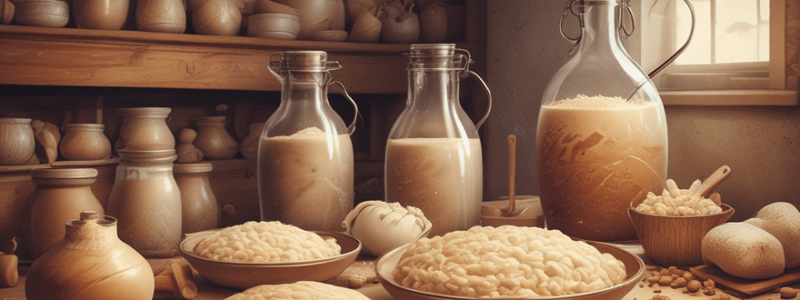Podcast
Questions and Answers
What is the primary role of water in dough making?
What is the primary role of water in dough making?
- To create a sticky dough
- To facilitate fermentation by yeast, bacteria, and enzymes (correct)
- To weaken the gluten bonds
- To create a cottony crumb
Why might some bakers prefer to use spring water?
Why might some bakers prefer to use spring water?
- Because it's less expensive
- To avoid chlorine and other additives (correct)
- To create a stickier dough
- To lengthen fermentation times
What is a potential benefit of using hard tap water or well water?
What is a potential benefit of using hard tap water or well water?
- It strengthens the dough due to mineral content (correct)
- It lengthens fermentation times
- It creates a stickier dough
- It weakens the gluten bonds
What can happen to fermentation times when using soft water?
What can happen to fermentation times when using soft water?
How does the absence of water affect gluten formation?
How does the absence of water affect gluten formation?
What is a characteristic of dough with a high water content?
What is a characteristic of dough with a high water content?
Why is packaged water not a practical solution for most professional bakers?
Why is packaged water not a practical solution for most professional bakers?
Flashcards are hidden until you start studying
Study Notes
Water in Dough Making
- Water is a critical ingredient in dough making, and yeast and bacteria cannot thrive without sufficient water.
- Adding or subtracting water from a dough or pre-ferment can have profound effects on the rate and type of fermentation.
- Amylase, an enzyme critical to fermentation, cannot degrade starch into sugars without sufficient water.
Effects of Water on Dough Structure
- Water content affects the structure of bread dough, with gluten formation dependent on the presence of water.
- Excess water creates an ideal environment for enzyme activity, weakening gluten bonds and making dough stickier.
- Dry dough tends to be stronger, with a close, cottony crumb, while extra water ensures a more extensible dough with large, irregular holes and a chewy texture.
Source of Water
- Some artisan bakers use spring water to avoid chlorine or other additives in tap water.
- However, using tap water is a common practice among professional artisan bakers, as the levels of chlorine or other chemicals are unlikely to negatively affect fermentation.
- The mineral content of hard tap water or well water can give dough greater strength and benefit fermentation, while soft water tends to lengthen fermentation times and may give dough an unusual level of extensibility.
Addressing Water Issues
- Installing filtration systems can help address issues with water quality or additives.
- Adjusting fermentation times or adding sets of folds during bulk fermentation can compensate for a lack of strength in dough due to too-soft water.
Studying That Suits You
Use AI to generate personalized quizzes and flashcards to suit your learning preferences.




